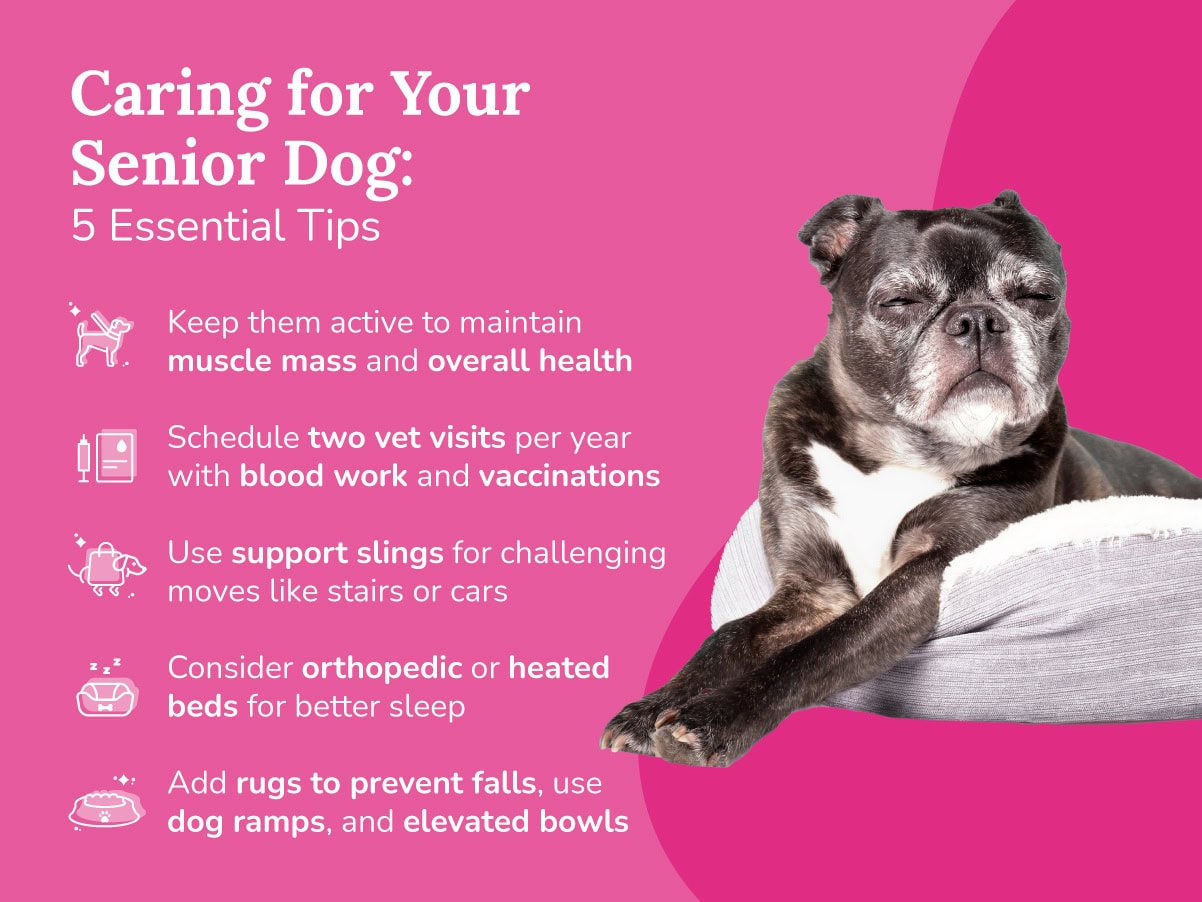As our beloved furry companions age, their needs undergo a natural transformation. While the age at which a dog is considered ‘senior’ can vary, it’s generally around the age of 7, though this can differ based on their size and breed.
With age comes subtle changes in behavior and activity, providing us with valuable insights into their well-being. Recognizing these signs and knowing how to support them is essential to ensure our furry friends experience their golden years to the fullest.
Here are five tips for senior dog care:

1. Provide Physical Activity
Older pups still have that playful spirit and staying active is essential. As they age, they risk losing some muscle, so regular movement is key. Beyond maintaining muscle strength, activity helps with weight management, a vital factor in managing joint issues like arthritis.
Watch them during their playtime or walks. If they show signs of slowing down or discomfort, consider adjusting their routine. They might not have the same energy as in their younger days, but a gentle walk or some light play can do wonders. It’s about finding the activity that suits their age and health best.
3. Optimize Their Sleeping Spots
Every dog has its favorite snoozing spot, but for our senior pals, it’s even more essential that they get the perfect resting place. As they grow older, their bones and joints can become more sensitive. An orthopedic bed can offer them the cushioning and support they need.
Also, for the cooler nights or if they tend to feel cold, pet-safe heated beds can be their cozy retreat. Especially for dogs with arthritis or joint concerns, these special beds can make all the difference. A good night’s sleep can improve mobility and relieve pain.
Related reading: Why Do Dogs Sleep So Much?
4. Assist with Their Mobility
As dogs age, their mobility can become limited, making certain activities more challenging. Tools like dog support slings and harnesses can provide the necessary support they require. These aids are specifically designed to help reduce strain and ensure safer movement. They’re useful in situations where extra assistance is needed, such as navigating stairs or getting into vehicles.
By incorporating these tools, you can ensure that your senior dog moves with ease and confidence.
5. Make Home Modifications
Small changes at home can have a significant impact on the comfort and safety of your senior dog. Adding more non-slip carpeting or introducing well-fitted dog socks can significantly improve traction, reducing the risk of slips and falls. For those spots that are a bit harder to reach, like beds or vehicles, dog ramps are a practical solution that can simplify access.
Elevated dog bowls not only aid in comfortable eating but can also promote better digestion. Consider increasing the number of water bowls around your home to ensure your senior dog stays hydrated.
Additionally, with age, a dog’s night vision may decline. Placing nightlights around your home can help them navigate during the darker hours, providing them with added confidence and security.
{% video_player “embed_player” overrideable=False, type=’hsvideo2′, hide_playlist=True, viral_sharing=False, embed_button=False, autoplay=False, hidden_controls=False, loop=False, muted=False, full_width=False, width=’1080′, height=’1920′, player_id=’174450462855′, style=” %}
6. Schedule Regular Canine Health Checkups
Looking after our senior pups means staying on top of their health needs. Regular veterinary checkups, ideally twice a year, are a great way to make sure everything’s okay. Between those visits, keeping your dog’s vaccinations up to date is key.
Don’t skip the annual blood and urine tests either; they help spot common issues like kidney disease or diabetes early on. Sometimes, a chest or abdominal X-ray might be suggested.
Also, if you notice they’re acting a bit off or moving differently, it’s always important to consult your veterinarian.
Conclusion
Our senior dogs’ needs might shift as they age, but our dedication to their well-being remains constant. From physical activity to wellness exams, each step is about their comfort and health. These older companions have a special place in our hearts. As they enter their golden years, let’s ensure those years are filled with care, comfort, and lots of love.
If you notice changes in their health or have concerns about their well-being, schedule a Quality of Life consultation for your dog with us. We’re here to provide the specialized care they need for a happy and healthy senior life.
Frequently Asked Questions
What age is considered a senior dog?
Dogs are generally considered seniors starting around the 7-year mark. However, the specific age can vary depending on the breed and size, with larger breeds often reaching senior status earlier than smaller ones.
How often should senior dogs have vet checkups?
Senior dogs should visit the veterinarian at least every six months for regular checkups and more frequently if health issues arise.
Do older dogs need vaccinations?
Yes, older dogs still need vaccinations, though the type and frequency might differ. It’s essential to consult with a veterinarian to determine the appropriate vaccine schedule for senior dogs.
Are senior dogs prone to specific health issues?
Yes, senior dogs can be more susceptible to health issues like arthritis, dental disease, heart conditions, and kidney problems. Regular veterinary checkups are crucial to monitor and address these potential concerns.
How do you know if your senior dog is suffering?
Signs your senior dog might be suffering include decreased appetite, lethargy, noticeable weight loss, difficulty moving, or changes in behavior. Always consult a veterinarian if you suspect any discomfort or pain.





